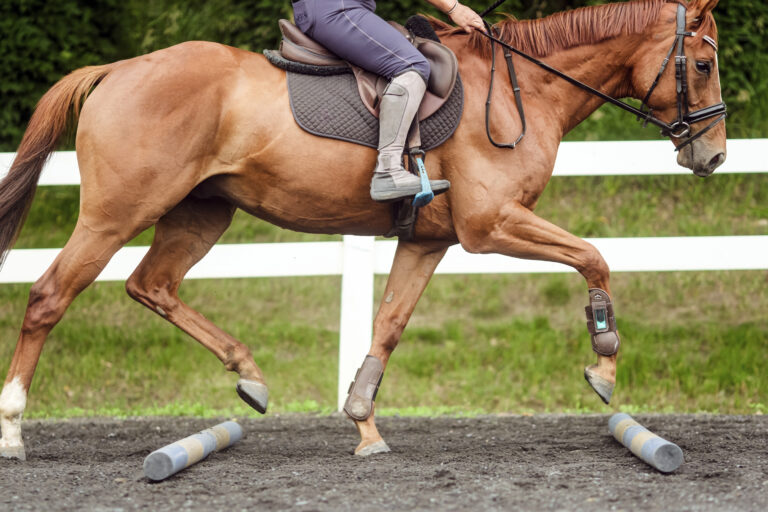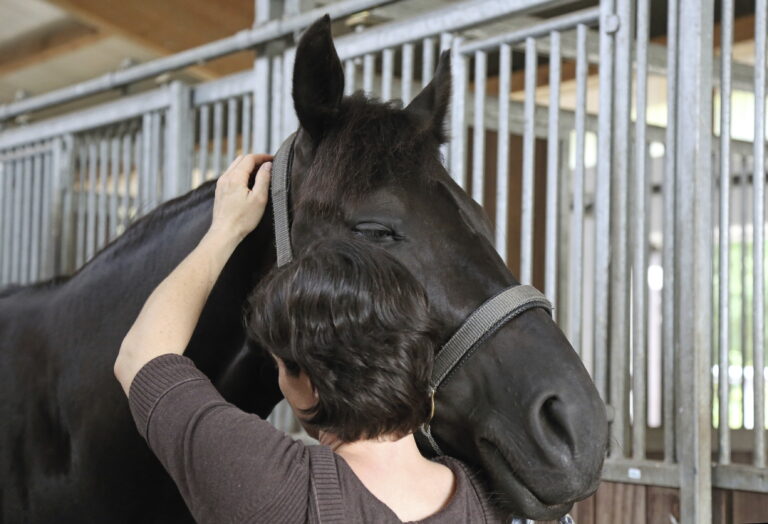
Lillipad, an 11-year-old Thoroughbred mare, was presented at a breeding sale in Washington, but was labeled barren and went unsold. A friend of Jillian Fallon of Reno, Nevada, rescued Lillipad after the sale and sent her to Fallon’s ranch. While the trailer ride to Reno was uneventful, her condition deteriorated shortly after arrival.
Fallon noticed that her respiration, heart rate, and temperature were all elevated to dangerous levels. A local veterinarian performed an ultrasound at the ranch and diagnosed her with pleuropneumonia, having found fluid build-up in and around both lungs. Medications administered onsite helped bring Lillipad’s vital signs down closer to normal levels, but it was clear she needed further treatment. So, Fallon brought her to the UC Davis veterinary hospital the next morning.
“I was hesitant to put her through another long trailer ride considering her condition,” Fallon said. “But after all we went through, I’m glad we went to UC Davis.”
Treatment for Pleuropneumonia at UC Davis
Lillipad would remain hospitalized for three months, culminating in a shocking surprise for her owner and care team.

She was treated extensively for severe pleuropneumonia for many weeks, including management with fluid drainage through multiple chest tubes and a thoracotomy, aggressive antibiotic therapy, and intense supportive care by a dedicated team of students, technicians, residents and faculty members in the Equine Internal Medicine Service.
Throughout all of this, Lillipad was not responding as well as could be expected, and she lost a significant amount of weight, except in her abdomen. To be certain of all possible scenarios, her care team performed an ultrasound and could not believe what they discovered.
Lillipad, previously deemed barren, was pregnant!
Pregnancy
They also found evidence of hemorrhaging into her abdomen as a consequence of the pregnancy. The Equine Reproduction Service examined Lillipad and found the foal to be of proper size with a good heart rate. However, Lillipad was still critically ill, and it was unknown how her illness and its complications would affect the continued growth and health of the unborn foal, as well as her ability to have a normal birth. Luckily, it was known that this would be her fourth foaling, so the medical team felt more confident she could handle the birth if she and the baby were healthy enough.
Thankfully, Lillipad’s hemoabdomen stabilized quickly. Her pleuropneumonia continued to slowly improve over the next two months, and she was transferred from the hospital’s Large Animal Clinic to the layup services at the UC Davis Center for Equine Health for a few weeks before returning home. There, she was checked regularly regarding the progress of her pneumonia, thoracotomy incision sites and the viability of her foal.
She was discharged in January 2022 with about two months remaining of her very high-risk pregnancy, with the continued risk of foaling prematurely. Because of these risks, it was recommended that Lillipad return to UC Davis for the birth if she carried the foal to term. In the event that she would need surgery, had difficulty during labor or started hemorrhaging again, time would be of the essence and immediate intervention would be needed.
Successful Foaling

Lillipad did very well at home, gaining weight and finally starting to act like a spirited mare with a zest for life. Fallon returned her to UC Davis for foal watch in March, where she continued to improve and was off all medications before the big day. On March 27, she experienced a quick, uncomplicated birth and delivered a healthy filly.
“Lillipad was a difficult case and involved the dedication of everyone on the Equine Internal Medicine Service, as well as multiple technicians and students,” said Dr. Emily Berryhill. “She is a perfect example of the collaborative nature and extensiveness of our care at UC Davis. This success showcases that dedicated teamwork between our clinical staff, our clients, and our referring veterinarians can result in a positive outcome, even with many ups and downs in between. We are grateful to Ms. Fallon for entrusting us with Lillipad’s care.”
Lillipad and her filly, LP’s Sunny Miracle, or Mira for short, were able to return home a week later. Currently, Lillipad and Mira are healthy and happy at their forever home with Fallon in Reno.
This article originally appeared in the UC Davis Veterinary Medicine Winter 2023 Horse Report and on the UC Davis Veterinary Medicine website.









